Joshua Reviews Israel’s History at Shechem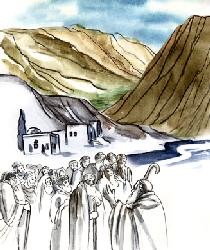
Joshua calls all the people, including the elders, their leaders, judges, and officers, to gather at Shechem as he speaks prophetically, recounting their history from the Lord’s point of view. Shechem was a fitting place for Joshua to remind his people of God’s working among them in their past. It was at Shechem, God promised Abraham that his descendants would inherit the land (Genesis 12:6-7). It was there that Jacob purchased land from Shechem and built an altar and called it “God-the god of Israel” (Genesis 33:18-20). At Shechem, located between Mt. Ebal and Mt Gerazim, the children of Israel reaffirmed their commitment when Joshua read all the blessings and curses of the law. Now, years later, just before his death, Joshua calls his people to recognize their proclivity for idolatry and to choose the Lord. There, at Shechem, they make a fresh covenant with the Lord (Joshua 24:25).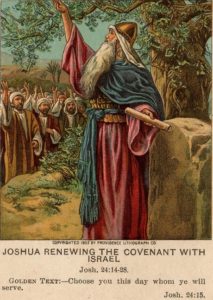
Joshua erects a stone monument as a witness to the pledge of obedience that the people are making to uphold the Law of God.
Joshua’s words are very challenging. He tells it like it is.
Joshua 24:19 19 Then Joshua said to the people, “You will not be able to serve the LORD, for He is a holy God. He is a jealous God; He will not forgive your transgression or your sins.”
He wants the people to recognize their unconfessed sin and admit their secret idolatries:
Joshua 24:14 14 “Now, therefore, fear the LORD and serve Him in sincerity and truth; and put away the gods which your fathers served beyond the River and in Egypt, and serve the LORD.
Joshua addresses them with piercing directness; he lets them know that their lifestyles gave him enough evidence to suppose that they had decided not to serve the God of Israel. He asks them to choose between the gods their fathers had abandoned, which they had become attached to in Canaan.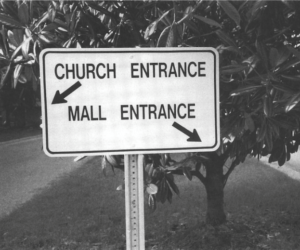
Joshua 24:15 15 “If it is disagreeable in your sight to serve the LORD, choose for yourselves today whom you will serve: whether the gods which your fathers served which were beyond the River, or the gods of the Amorites in whose land you are living; but as for me and my house, we will serve the LORD.”
He says, “You can go on with your idols of choice, but as for me and my house, we will have nothing to do with the false deities of this world. We will serve the Lord.”
Didn’t they realize that their idols have done nothing to contribute to their redemptive history? Joshua recounts their history and, speaking prophetically, uses the Divine pronoun, ‘I’ 17 times. Everything great about their past was due strictly to the Lord’s doing. Starting with the call of Abraham, Joshua says, “Thus says the Lord, …” I took your father Abraham, led him through the land, gave him the promise, gave him Isaac, gave Isaac, Jacob, gave Jacob, his sons. When they were in bondage, I gave them Moses and Aaron, I sent the plagues, brought you out of Egypt, delivered you from your enemies, fought your battles, gave you the victories, and gave you the land you are dwelling in today.” The Lord acted on their behalf. Were they grateful?
Joshua repeats the call to have his people put away the foreign gods in their midst and incline their hearts to the Lord, the God of Israel.
The people make their solemn vow: “We will serve the Lord our God and we will obey His voice” (Joshua 24:24).
The scene concludes with Joshua dismissing the people, “each to his inheritance.”
There is an epilogue written by someone other than Joshua unless he wrote it as a fore-teller! These short verses tell of Joshua’s death at 110 years and his burial in the town of his inheritance, Timnath-serah.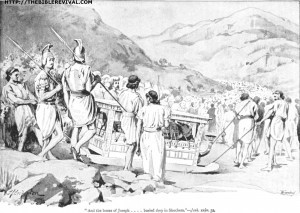
THE BURIAL OF THE BONES OF JOSEPH
Here at Shechem, the people finally bury the bones of Joseph, which he had requested be brought out of Egypt, more than 40 years earlier.
READING FROM THE NEW TESTAMENT: LUKE 21:1-28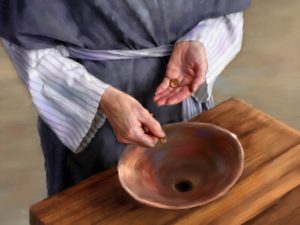
These events are taking place in the week leading up to Jesus’ crucifixion. In the temple he observes that all is not as it seems. The rich give the impression that they are pious in making large financial contributions to the temple treasury. Jesus discerns that these people are giving out of their surplus money that they have left over after spending on their self-indulgent lifestyles. In reality, and from Divine Viewpoint, they are giving much less. In contrast, Jesus points out a poor widow who was giving sacrificially. She put into the treasury far more than these rich men because she gave out of her poverty, giving all that she had to live on, recognizing God’s worthiness.
This incident could also be seen as an example of how the religious leaders exploited the poor, causing them to be destitute while they themselves lived in unjustified affluence.
Jesus then moves outside. As they pass the temple, Jesus makes his prediction of its destruction in which there will not be left one stone upon another. As we have learned, this prophecy will be perfectly fulfilled in 70 AD when Jerusalem is ransacked and the temple destroyed by the Roman armies under Titus.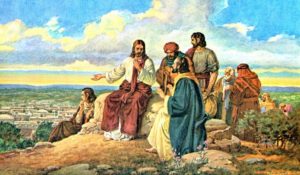
The disciples leave the Temple Mount and cross the Kidron River to the Mount of Olives. In verse 7, what is known as “The Olivet Discourse” begins.
Two questions are asked:
- When will these things happen? (The destruction of the Temple).
- What will be the sign when these things are about to take place?
Jesus gives an answer, but He does not focus on the time or the signs as much as He focuses on what kind of people they need to be in light of what will happen in the future. (This applies to us!)
- Don’t be misled. There will be many pretenders, false teachers, false prophets and false Christs. Do not go after them. Follow the Word.
- Don’t be fearful. The world is in a state of spiritual upheaval. Christ’s kingdom will come at the end of the age after a series of difficulties, coming upon the world like birth pangs and heavy travail — wars, and rumors of wars, natural disasters, persecution, and legal trials where believers are brought before officials for the Name of Christ.
- Share your testimony of Christ at every given opportunity. The persecution and trials “will lead to an opportunity for your testimony.”
- Endure hardship. God is with you, sustaining and protecting you. Persecution is inevitable for those who live godly in Christ Jesus (Luke 21:17-19; 2 Timothy 3:12).
- Be ready to ask God for wisdom (Luke 21:15; James 1:5;) and protection (21:18) when you need it.
- Straighten Up. Stay awake. Lift up your heads. Live with the eternal in view. (21:28)

The verses in Luke 21:20-21 describe Jerusalem being surrounded by armies. This happened, in part, in 70 AD. However, there is much here in the Olivet Discourse that is yet to be fulfilled and will take place in what many Bible scholars refer to as a seven-year period in the future, known as “the Great Tribulation,” ‘the 70th week of Daniel’ (See Daniel Chapter 9), or the time of Jacob’s distress (Jeremiah 30:7).
These are the days when the Antichrist comes to power, and the abomination of desolation takes place in which he will demand that he be worshiped instead of the true God (2 Thess 2:3-4; Daniel 7:25-26; 8:9-14; 9:27; Revelation 13:5-10). He will make a pact with Israel which he will break half-way through the 7-year period (Daniel 9:27).
Jesus (Matthew 24:15-28), the Apostle Paul (2 Thess 2:1-12), and the Apostle John speak about the person of the antichrist (Revelation 13, 1 John 4:3).
The Second Coming of the Lord Jesus is described in verse 27:
Luke 21:27-28 27 “Then they will see THE SON OF MAN COMING IN A CLOUD with power and great glory. 28 “But when these things begin to take place, straighten up and lift up your heads, because your redemption is drawing near.”
TODAY’S READING FROM THE PSALMS
Psalm 89:38-52; This Psalm confirms and expounds the Davidic covenant (2 Samuel 7:9-14). Verses 38-52 describe the chastening experienced by the disobedient successors of David on the throne and the nation of Israel as a whole.
Verse 52 is very important.
Psalm 89:52 52 Blessed be the LORD forever! Amen and Amen.
No matter how much we suffer because of the sins of others, how much chastening we experience because of our own sins, or how perplexed we may be by God’s providential circumstances, the Lord is to be praised!
TODAY’S READING FROM PROVERBS- Proverbs 13:20-23
CHOOSE YOUR COMPANIONS WISELY; USE YOUR WEALTH WISELY AND JUSTLY
Proverbs 13:20-23 20 He who walks with wise men will be wise, but the companion of fools will suffer harm.
21 Adversity pursues sinners, But the righteous will be rewarded with prosperity.
22 A good man leaves an inheritance to his children’s children, And the wealth of the sinner is stored up for the righteous. 23 Abundant food is in the fallow ground of the poor, but it is swept away by injustice.
PRAY FOR THE NATIONS
(From OPERATION WORLD PRAYER GUIDE, available online or at the New Life Community Church Book table).
Republic of China, Taiwan
Asia
Area: 36,000 sq. km
A mountainous island 160 km east of mainland China, together with the Penghu archipelago and the islands of Matsu and Kinmen close to the mainland. One of the world’s most densely populated countries.
Population: 23,561,660 Annual Growth: 0.58%
Capital: Taipei
Urbanites: 81%
Peoples: 41 (32% unreached) All peoples
Official language: language and language of education Mandarin. Hoklo and Hakka are widely spoken Languages: 28 All languages
Challenges for Prayer
Youth and university students are generally more open to the gospel. The key to reaching this group of over one million people is dynamic and relevant outreach. The Presbyterians sponsor 60 Christian study groups in universities and churches. Campus Evangelical Fellowship (IFES) has an outreach to students, with 40 full-time staff workers also ministering in secondary schools. CCCI has a large campus ministry. Student ministries are training local churches for this kind of ministry; pray for churches to mobilize toward this vision. Pray for these young hearts to grow in maturity as they dedicate their lives for Christ.
A decline in numbers of missionaries working in Taiwan has become evident in the last 20 years – more marked than any other country in Asia. This is not due to a finished task but rather to attrition and the attraction and fruitfulness of other locations. The door is wide open for missionaries to enter and serve in many capacities; it is especially ideal for those looking to do full-time mission work rather than tentmaking. Cults such as the Mormons seize this openness by sending huge numbers of missionaries; how can biblical Christians allow it to be ignored? Pray that evangelical missions might fully exploit this window of opportunity. The largest agencies include YWAM, AoG, OMF, SEND, TE, OMS, Free Methodist.
PRAYER: Father, thank You for drawing us out of our dream state of idolatries and delusions and bringing us to repentance and faith in the glorious Person and work of Your Son. We choose this day to serve Him. By serving Him, we are serving You. We want to live each day as if it were our last, ready to meet our Savior and King. Keep us from the schemes of the evil one, renew our minds with Your Word so that we are not misled. Help us to endure hardship and take advantage of opportunities to share Your Word. Help us to boldly proclaim the good news. In Jesus’ Name. Amen.
- Pastor David
